Contents
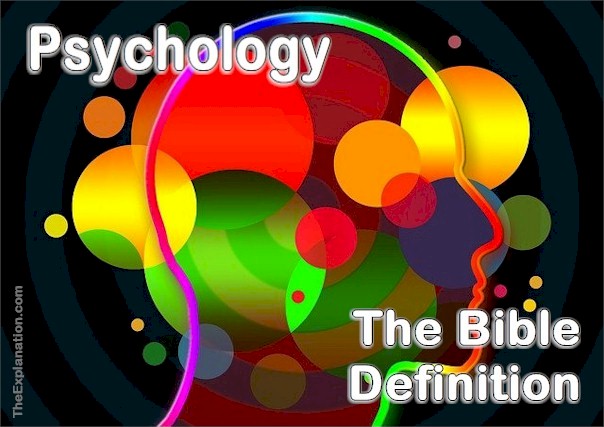
We’ve solved the mind-body problem. Consciousness is neshama and mind is ruach, the two spiritual components God gives (Genesis 2:7) that make each human unique. Humans are in contact with both the physical world, the energy packets around them, AND God through the Holy Spirit in due time.
(Mind-Body Problem Solved, Chapter 35 – Table of Contents)
Two Greek words compose psychology; psyche, meaning mind, and logos, meaning study. In English, we use psyche with other significations like spirit and soul. The Explanation has already clarified that the mind is ruach, the spirit in (hu)man(s) (Job 32:8) placed there by God. So if we want to use the term spirit, no problem, just so long as we realize it comes from God and relates to the Holy Spirit in that we can communicate with each other and with Him (Romans 2:8 God’s Spirit witnesses WITH our spirit…).
We have also established that this R/ruach (whether it be God’s or humans’) is a P/power. This P/power can activate, mobilize, trigger, switch on, call on, and stimulate; specifically, the spirit in humans energizes our consciousness, the neshama.
The mind is spirit; hence, it is invisible and outside the material body. The physical brain is the transducer that converts mind waves to brainwaves and vice-versa. It allows our mind to interact with our body to transmit our physical sensations (from our five senses) to our non-physical thoughts and vice versa.
Consciousness
At the base of the mind is consciousness. As defined by Genesis 2:7, this is the neshama, the understanding, and awareness, that God places in each human being. Consciousness is there from birth and is the fundamental makeup of every human. Neshama identifies what a human is.
My confession. When I wrote those consciousness chapters in Section 3, I put them in a pyramid because of Maslov’s pyramid of human needs. At the time, I fought with what should be at the base and summit and the order of the five elements. In the pyramid, they are, from bottom to top: functions, reasoning, socialization, rulership, and purpose. As the book developed, I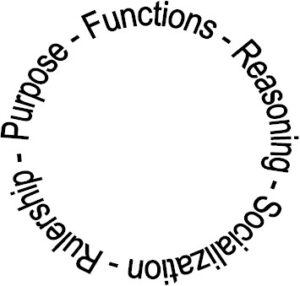 realized that order did not make sense, and now it’s time to correct it. I’ve decided to leave the former chapters with the pyramidal diagrams as they are, simply to show the original idea and how we can be wrong when reasoning based on previous work and accepted assumptions.
realized that order did not make sense, and now it’s time to correct it. I’ve decided to leave the former chapters with the pyramidal diagrams as they are, simply to show the original idea and how we can be wrong when reasoning based on previous work and accepted assumptions.
These five elements need to be placed in a circle where neither is above any other. All five elements are present in each human, and the interaction is permanent and continuous right from the start of life and throughout it to the end. I want to portray it as a circle.
Mind
This circle is encompassed on all sides by the mind, the spirit, and ruach. I’ve represented it in the diagram with a yellow-beige 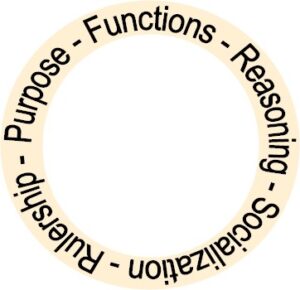 circle associated with the five areas of consciousness. The reason is that neshama and ruach are inseparable. The mind is continuously active around something to do with consciousness. Psychology involves both working together.
circle associated with the five areas of consciousness. The reason is that neshama and ruach are inseparable. The mind is continuously active around something to do with consciousness. Psychology involves both working together.
Everything the mind does, thinking mentally, or accomplishing physically, is associated with the five elements of consciousness. For instance, take purpose. Each person thinks about their purpose in life; some, even many, depending on culture and other circumstances, have no say in their life destiny. Others may follow their whims. Many might not know and take time to figure it out. Based on their talents and likes, some might know at an early age what they want to accomplish and set a plan in motion to reach that goal.
All the thinking, hesitation, fortitude, planning, effort or not to do something with one’s life is mind activity around the conscious concept that humans have a purpose.
Internal influences
Our consciousness and minds are subject to every influence around us. So these effects need to be added to the definition of the psychology diagram. To different degrees, each person has Intuition, personal experiences, sub-conscious activity, dreams, emotions, and feelings… These are very powerful because they are vivid personal events we have lived in our minds and bodies. They are real and authentic. There’s no point in denying them and no point in trying to convince someone of their non-existence.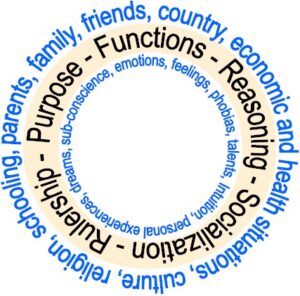
We shall devote an entire chapter and more to these various inner events and impulses.
External influences
These are events over which we have no or little control. We are born into conditions beyond our power; , or the lack thereof during our upbringing.
In my initial pyramidal approach to consciousness, I put how humans function at the base. However, the first influence we undergo is socialization. Do parents, mother, and father cuddle us? Does Mom breastfeed us? Is Dad present, and does he play with us? Simple questions but everlasting effects on babies to be, children to be, adults to be, and the next generation of leaders responsible for the generation of babies after us. And the circle goes round and round.
This is the nurture aspect of human make-up each of us bears and, in adolescence and adulthood, brings into our decisions, relationships, and way of life. These influences can be negative, neutral, or positive. We all have a personal mixture of these traits representing our personality and character. This whole combination of components makes us an individual like no other on this planet.
Let’s look at the meaning of the two Greek words that compose psychology, psycho and logos.
Psyche
The number of translations in Hebrew and Greek reveals the difficulty with the concepts of spirit and mind.
In Hebrew, mind is translated by the words: zimma (plan – H2154), yetzer (purpose – H3336), lev (heart – H3820), nefesh (soul – H5315), peh (mouth – H6264), ruach (spirit – H7307)
There are 15 Greek words rendered mind or derivatives like bring to mind. The principal words are noos (understanding – G3563), and phroneo (understanding – G5426). The primary Greek word is psuche (G5990) from which we get psycho, the first part of psychology. It appears 109 times and is rendered mind a mere 3x, life 40x, and soul 58x.
ψυχή psuchē psoo-khay’; From G5594; breath that is (by implication) spirit abstractly or concretely (the animal sentient principle only; thus distinguished on the one hand from G4151 which is the rational and immortal soul; and on the other from G2222 which is mere vitality even of plants: these terms thus exactly correspond respectively to the Hebrew [H5315] [H7307] and [H2416]:
KJV – heart (+ -ily), life, mind, soul + us + you.
Here’s what Wikipedia says about psyche, which is the basis of the word and discipline psychology.
In psychology, the psyche is the totality of the human mind, conscious and unconscious… The basic meaning of the Greek word ψυχή (psyche) was “life”, although unsupported, some have claimed it is derived from the verb ψύχω (psycho, “to blow”). Derived meanings included “spirit”, “soul”, “ghost”, and ultimately “self” in the sense of “conscious personality” or “psyche”.
When it comes to the word’s origins, Wikipedia (unsupported derivation from to blow) is opposed to Strong (from G5594; breath). The Explanation simply states that biblically, both ruach and neshama imply breath (breath of life – Gen. 2:7).
Also, regarding the word neshama, the Hebrew translations have a dilemma. Even more, bringing the concept of neshama into the New Testament. Most readers are unaware of neshama in the Old Testament and certainly not in the New Testament.
The bottom line is this, neshma and ruach, consciousness and mind are indissociable. They are two peas in a pod, so the psyche in psychology must include both elements. Look at this verse.
Only let your conversation be as it becomes the gospel of Christ: that whether I come and see you, or else be absent, I may hear of your affairs, that you stand fast in one spirit (G4151 pneuma), with one mind (G5590 psuche) striving together for the faith of the gospel;
We have no difficulty understanding the English translations spirit and mind. However, I would offer you a possible alternative; ruach (pneuma – spirit) and neshama (psuche – consciousness). I did say possible alternative, my verdict is still out, but do you see how neshama and ruach, consciousness, and mind assemble together? We will conclude by saying the psuche/psyche in the word psychology involves the immaterial components of humans, the neshama and ruach.
Logos
In dictionary terms, logos, the logy of psychology means a study or research of the mind. So that you understand the confusion that reigns in the study and research of the mind, I suggest you peruse this article. I leave you with a partial quote, “…there is still a lot of difference of opinion concerning what the exact nature of mind is, and various competing definitions have been proposed.” That says it all.
Logos presents us with other meanings like logic or reasoned discourse, as well as logo, identifying signs of companies and organizations we see around us all the time. In Biblical terms, Logos is of the utmost importance, translated Word and used as the name of God (Revelation 19:13) and Scripture (Luke 8:11).
Logos means sound reasoning; proper science dealing with the rules and processes used in accurate thinking and reasoning. The logic, reflection, and meditation that comes from God’s Word. So, the definition of psychology is NOT about humankind’s research of the psyche; it’s the neshama and ruach (psyche) according to God’s Word (logos).
The definition of psychology: God’s Word applied to the neshama and ruach.
In summary, below are the five fundamental aspects of consciousness and the practical everyday application by the mind. The final diagram reveals the psyche under the benevolent umbrella of God’s Logos: practical, efficient, godly psychology.
1. The Purpose of Life (Chapter 15)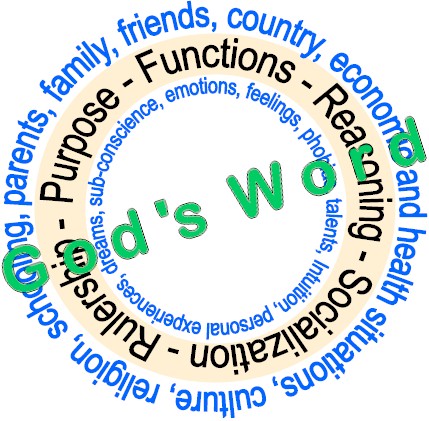
- Nature of Humans, Consciousness & Mind
- Space-Time
- Creativity
- Imagination
- Learning
- Choices
- Growth Mindset
- Facing Challenges
- Rule Life Responsibly
2. How Humans Function (16)
3. Social Relationships (17)
- Human Society
- Unique Individuals
- Gender Equality
- Bride and Groom
- Couple Relationship
- Marriage
- Family
- Parenting
- Extended family
- Ethnicity
- Nations
- Languages
- Globalization
4. Human Rulership (18)
- Human Government
- Governance Structure
- Government for the People
- Human Needs
- Inner Peace
- Peace of Mind
- National and Individual Prosperity
- History of Individuals and Nations
- Individual Rights vs Collective Rights
- Peace
- Government Organization
- Best Form of Government
5. Reasoning (19)
Psychology is the five properties of neshama activated by the ruach, the fundamental elements of our consciousness developed by our mind power in accord with God’s Word. That’s wonderful for people who might believe in God’s Word, but what about all the others? Is God interested in all individuals’ well-being, regardless of their belief in Him? In other words, can modern psychology apply principles from the Bible to establish, improve, and maintain the mental health of all people, regardless of culture and beliefs? We shall see this in the next chapter.
Dig Deeper into The Explanation
Online Study Courses to Uncover the Mystery of Adam and Eve’s Nakedness… with no fuss. Free video mini-course revealing the God-intended meaning of Scripture via Biblical Hebrew. It’s so easy, it’ll blow you away. Join now and add new motivation to your Bible study.
Join The Explanation Newsletter to stay informed of updates. and future events. No obligations, total privacy, unsubscribe anytime, if you want.
The Explanation series of seven books. Free to read online or purchase these valuable commentaries on Genesis 1-3 from your favorite book outlet. E-book and paperback formats are available. Use this link to see the details of each book and buy from your favorite store.

Since you read all the way to here… you liked it. Please use the Social Network links just below to share this information from The Explanation, Psychology, what is it? The Best Bible Definition for Humans



Let’s Connect!